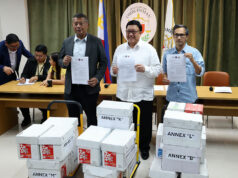Twice have I been designated as expert resource person to the Senate hearings on the recent dengue vaccination debacle. Many in the media called me “whistleblower,” but instead of fear, I am instead moved with much concern.
Observing the events unfold and hearing the sentiment of the people, I think I share a burning question with many others: Was this a well-designed, planned and implemented mass vaccination campaign during the 2016 national elections? Or was this a well-designed,
planned and implemented mass campaign using immunization during the 2016 national elections?
I am only a public health advocate, hence I cannot comment on the latter. Let the seasoned
politicians debate whether or not mass vaccination was a good election campaign strategy.
However, it if it were the former, the following should have happened:
First, the designated subnational program manager would have the experience and expertise in running a new vaccination initiative which includes major components like vaccine services and sessions, vaccine cold chain logistics, behavior change communication and health promotion, social mobilization and community participation, disease surveillance, and monitoring and evaluation with coverage surveys. It is worthy to note the Philippine Children’s Medical Center (PCMC) had none of these competencies. The main reason why PCMC was selected is directly attributable to the late issuance of the Special Allotment Release Order (SARO) authority to incur obligations, and the DOH practice of sub-allotting funds to government medical centers to procure items for the department’s central office.
Second, when one plans for a new, big health project, the primary consideration is its “highest chance of success.” If the target vaccinees were Grade 4 school children and the vaccination sites will be their public schools, “the highest chance of success” would be to conduct the event when the students, teachers and even parents are all around — when there are classes.
Third, vaccination and health promotion are twin interventions in immunization programs.
The most effective prevention in any public health program which targets disease reduction is improving health literacy among mothers, families and communities. After all, they are the primary producers of health — not the DOH, nor LGUs and international agencies.
Disclosing pertinent information to the mothers and children is particularly mandatory in routine immunization.
On another equally important matter, the issue of “bad science” — the newest pronouncement in a recent hearing — which sees decision-makers receiving bad advice seems to me providential. Experts sounded the alarm as early as March 2016. The DOH then did not care to listen. It was full steam ahead.
For whatever reason, DOH found the time and urgency to implement the “mass vaccination campaign” during the 2016 national elections. From the other field, from nowhere, came the November 27 announcement of Sanofi Pasteur. If this is not providential I do not know what is.
A career public servant of more than three decades stated under oath, “health and politics do not mix,” and immediately after, another who served more than five decades (and is presently a senator) agreed with this patriot lady.
These investigations will continue to pick up until early next year, but so far, there are core issues that must challenge everyone involved:
This is a real-life nightmare for Filipino families and children. Greed and politics exposed 830,000 health children to potential harm and their parents to unnecessary worry that can extend decades. The only way to allay fear and confusion is to provide timely and correct information to the victims. This should have been done in the beginning. Without this information, there should have been no vaccination. But there was no full disclosure. No parental consent.
Imperfect science cannot conceal what is perfectly clear: people got greedy. Sanofi Pasteur is the manufacturer and supplier of Dengvaxia. DOH is the contracting party.
Even without the “bad science” issue, there were apparent red flags in the procurement and delivery of the new vaccination services. During the December 11, 2017 Senate hearing, I stated under oath:
• There is an ongoing wide-scale cover-up of senior DOH officials. DOJ and NBI should investigate DOH fast. There is hope since the present DOH secretary is not involved in the cover-up. However, those giving him advice on this issue are complicit to this Dengvaxia
mess. Presently, I have met with two DOH insiders (an Assistant secretary and a doctor program manager) who have the courage to come-out, tell the truth and show documents of collusion and corruption among undersecretaries (retired, resigned and incumbent),
assistant secretaries, central office and regional directors. I advised the two insiders to first seek clearance from the present DOH secretary.
• The P3.55B Dengvaxia mess is just the tip of the iceberg. A quick, comprehensive, and evidence-based investigation by DOJ and NBI will reveal that the P23B Health Facility Enhancement Program and the P12B Procurement of Medicines projects are of a similar
nature.
Yet this is not only about graft and corruption. It is also about honoring or defiling a great tradition among DOH secretaries. Almost all are well-respected, highly competent, educated coming from the best universities. The great tradition is the respect of the outgoing secretary to the incoming secretary, sincerely wishing the latter success. The outgoing secretary cuts cleanly. From Azurin (the last secretary of President Marcos), Bengzon and Periquet (President Aquino), Flavier, Galvez-Tan, Ramiro, Reodica (President Ramos), Estrella, Romualdez (President Estrada), Dayrit, Duque, Cabral (President Macapagal-Arroyo), Ona (President Aquino), Ubial and Duque (President Duterte).
Certain past DOH secretaries can be considered to be “hulog ng langit” for the Department and for all Filipinos. Alran Bengzon and Johnny Flavier lead the way. There were also Chit Reodica, Cuasi Romauldez, Manolet Dayrit and Espy Cabral. Certainly Secretary Duque, Enrique Ona, and Paulyn Ubial are among them.
Among these giants, I cannot help but consider one who broke tradition and fell from grace.
Nahulog sa hagdanan sa pagmamadali.
It is bad enough to steal from government coffers. But for a doctor to do harm to children?
That must be the worst sin of ambition.
FRANCISCO SALCEDO CRUZ, MD, MPH
Dr. Cruz is a former DOH Consultant on good governance, and is an expert on Vaccine
Preventable Diseases (VPD) and the DOH Expanded Program on Immunization (EPI). He was the VACC expert resource person during the Senate committee hearings on the Dengvaxia investigation.



